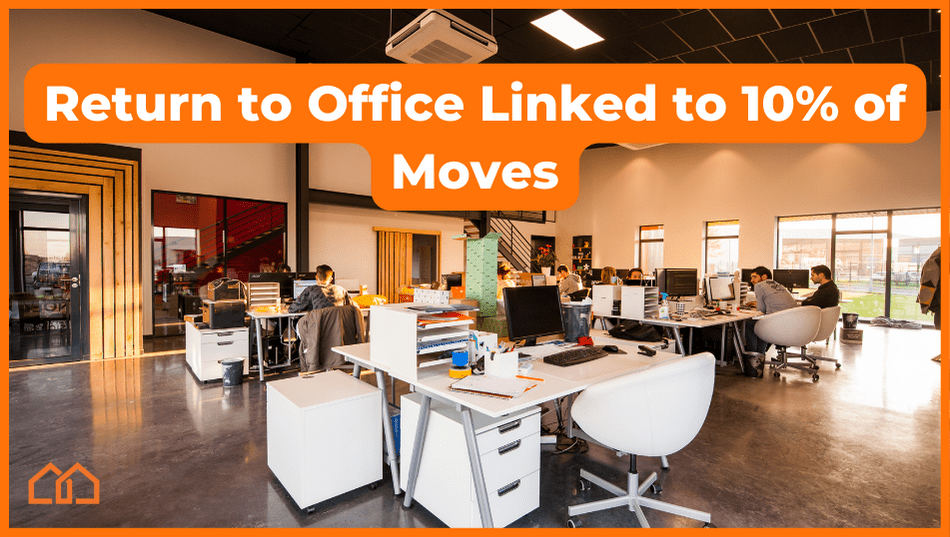Return to Office Mandates Linked 10% of 2023’s Home Sales
Remote work has been around since the 1990s, but it became well-known during the pandemic. When we were told to stay at home, remote work and homeschooling suddenly became the new way of life. This cut out the need for commuting and in-person work.
As a result, people in congested urban areas like New York City felt stifled. The higher cost per square foot meant being stuck in a cramped apartment for most of the day, making it a challenging time for America’s urban population. For the sake of mental health and logistics, many remote workers sold their city homes and moved into spacious, affordable homes in the suburbs.
Now, select employers in fields where in-person collaboration is essential have issued return-to-office mandates. While some of these mandates call for full-time five days a week in the office, others allow hybrid work to offer the best of both worlds.
However, no matter the arrangement, homeowners who live hours away from their original office are making tough choices regarding employment and relocation. From Seattle to California, Washington, DC, and beyond- work policies are influencing whether people decide to move — or look for a new job.
Redfin’s Real Estate Survey on Return to Office
This article pulls data from a survey that Redfin commissioned in May and June 2023 regarding reasons for moving. There were 616 respondents out of 5,079 who said that return-to-work policies are motivating their relocation. This amounts to (10.1%) U.S. home sellers. Companies like Amazon and Apple are pushing for the majority of their employees to be on-site by a certain deadline.
While a return to the office wasn’t the principal reason for moving, it was significant enough to take a place on the list of common reasons, which included wanting to be near family, having a bigger house, or living in a safer area.
Return to Office Effects on the Housing Market
As return-to-office policies ramp up, homeowners say affordability due to higher interest rates is a principal concern. Since many bought their homes during the pandemic when mortgage rates were lower, remote workers who moved to a cheaper market for more space now find themselves at a crossroads.
“Return-to-office mandates are forcing some people to choose between selling their home at a loss or losing their job,” Redfin said.
When shelter-in-place mandates changed the work environment overnight, few people worked in-office. The demand for commercial office space plummeted, causing record-high defaults no commercial loans. Many Americans also saw an opportunity to sell their expensive homes near metro areas and move to cheaper housing markets. This resulted in “Zoom Town Settlers” from big cities like San Francisco setting up house in more spacious, cheaper locations like Texas.
The sharp change impacted the real estate market in practically every facet. Home prices went up in traditionally cheaper markets and commercial and retail spaces lost demand. Real estate agents navigated a tumultuous real estate market where a hot seller’s market caused over-offering and extreme bidding wars.
The Advantages of in-Person, Hybrid and Remote Work
The debate is hot right now about what work model functions the best, but it’s safe to say that since every organization is different, there is no one-size-fits-all solution for everyone. For instance, there may be departments in one company that function better with in-person collaboration, while there may be other types of jobs that have a blend of collaborative and individual work, making hybrid an excellent choice.
Fully remote employees need occasional guidance but can complete all their tasks at home with a company computer. By keeping in touch with their team remotely, they don’t need to physically enter the office to achieve all their goals. This option is preferable to a company that is in growth but lacks office space for more desks, or if the position requires a niche skill that is hard to find. Offering remote capabilities allows employers to choose from a wider talent pool and find the expertise they need.
Even if an office is fully in-person, the option to work remotely can help with work-life balance and to maintain productivity when personal situations arise. For instance, an employee can work remotely if they are getting over a cold and don’t want to make the rest of the office sick. It’s also helpful for business travel and employees who get a last-minute call from school that their child is sick.
The advantage of remote work means that just like it was here before the pandemic, it can still be around even with back-to-office mandates in effect. It just depends on the company and if the nature of its mission can acommodate this work model.
What if you need a new home but can’t sell your current house for a profit?
If you have an existing home that is either upside down or you have not built enough equity to sell your home, then you can pursue other options, like turning your home into a rental. Early last year, it was common to over-offer to get the house of your dreams, but since interest rates were low, the mortgage payments were still manageable.
However, selling the same home to buyers using double the interest rate means selling for a lower price than what you over-offered. To avoid selling at a loss, homebuyers who would sell at a loss can alternatively turn their existing home into cash flow.
Marketplace Homes has been leasing homes for people who find themselves owning a home they can’t sell. Our real estate, leasing, and property management services are under one roof, making it incredibly convenient for our “accidental landlords” to find a solution for an extra home. Speak with our team today to explore your options!


